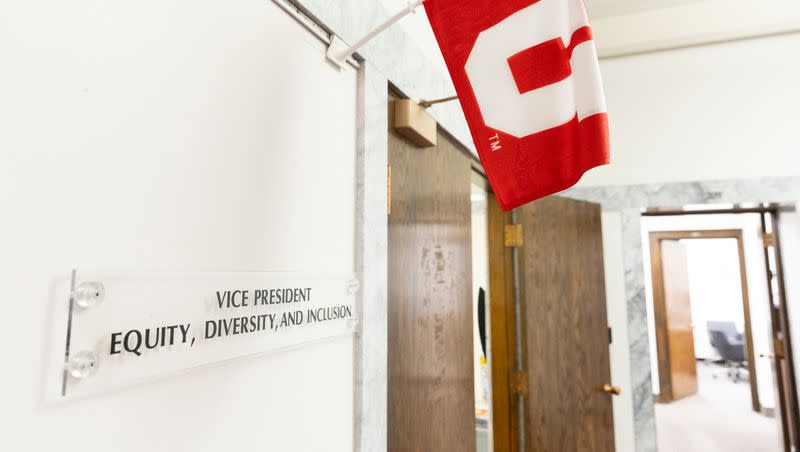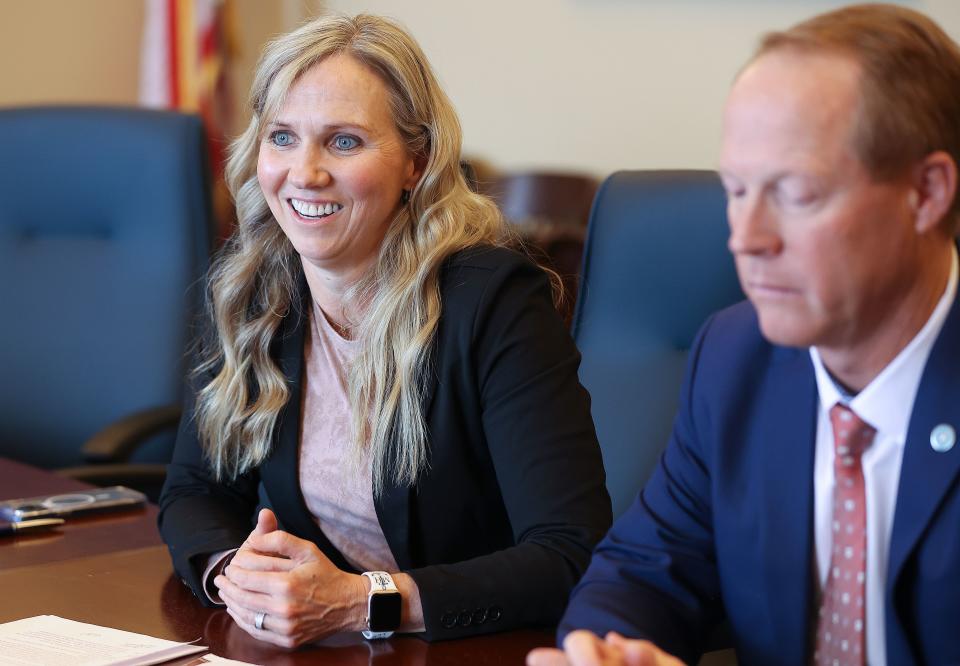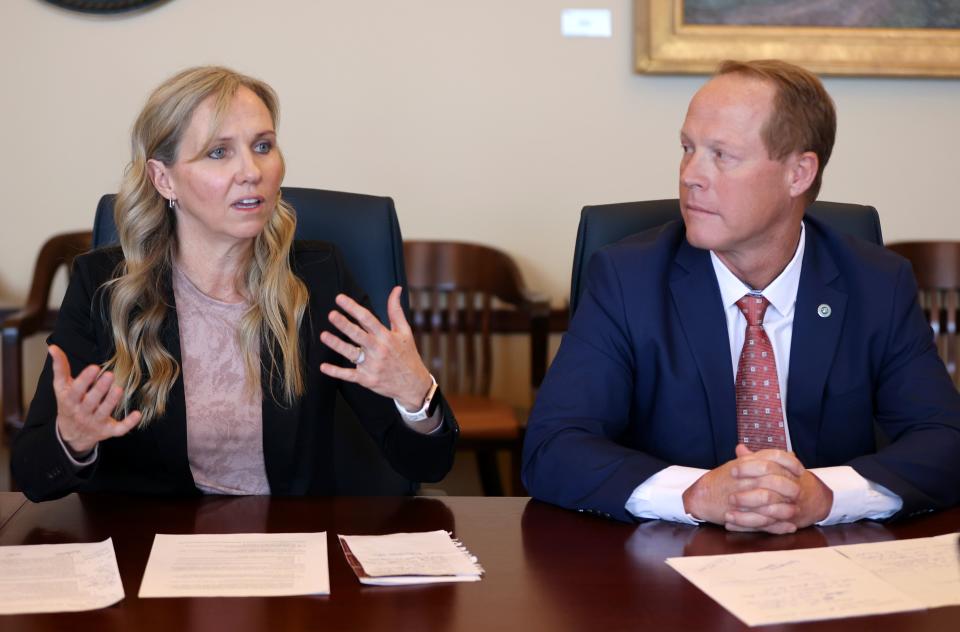Utah lawmakers say they’re creating national model for ‘positive’ DEI alternative

- Oops!Something went wrong.Please try again later.
- Oops!Something went wrong.Please try again later.
Two Utah lawmakers released the initial text of a bill seeking to overhaul diversity, equity and inclusion programs at public universities in the state.
The bill, HB 261, titled “Equal Opportunity Initiatives” was released on Thursday by Rep. Katy Hall, R-South Ogden, and Sen. Keith Grover, R-Provo. The bill authors say it would prohibit “discriminatory” DEI practices, including diversity statements in university job applications, would reaffirm institutional neutrality on college campuses and would fund student success centers that avoid differential treatment among students.
Utah Gov. Spencer Cox spoke out against DEI initiatives at a press conference last month, arguing they had failed to achieve their stated goals of helping students, instead fostering “identitarianism” and stifling intellectual diversity.
Cox’s comments were followed shortly after by declarations from the Utah Board of Higher Education and University of Utah President Taylor Randall that diversity statements would be discontinued in hiring processes.
During a presentation of policy priorities on Wednesday, Utah House Speaker Mike Schultz, R-Hooper, said the Legislature needed to “re-look” at how colleges approach DEI, “creating opportunities in ways to unite people rather than divide people.”
As states across the country attempt to navigate the subject of DEI, Hall and Grover said they hope their bill will stand out as a constructive alternative — both to DEI programs, and the legislation aimed at their complete elimination.
“We’re really hopeful that this is a positive bill and that it’s taken as a positive thing,” Hall told the Deseret News on Wednesday. “There’s been a big collaboration on getting that language just right to still capture all the things that DEI traditionally has wanted to capture but seems to be not quite capturing.”

What does the ‘Equal Opportunity Initiatives’ bill do?
As opposed to legislation introduced by Hall, and others, in 2023, HB 261 has the buy-in of House and Senate Republican caucuses, Hall said, and is the product of months of conversations with stakeholders.
According to the two lawmakers, their bill was formulated in deliberation with members of the state Board of Higher Education, college professors and university presidents, who contributed some of the language of the bill.
The Utah Board of Higher Education confirmed to the Deseret News that lawmakers sought the board’s input during the drafting of Hall and Grover’s bill.
The Deseret News reached out to the offices of University of Utah President Taylor Randall and Utah Valley University President Astrid Tuminez regarding their involvement in discussions surrounding Hall and Grover’s bill but did not receive a comment before the publishing of this story.
While the bill seeks to preserve some of the basic aims of DEI, like creating a sense of belonging on college campuses and supporting students with unique challenges, it does so without discriminating based on race or ideology, Hall said, as opposed to current DEI practices which sometimes include DEI requirements to achieve tenure or ethnicity-specific resource centers.
“As we’ve worked on this, I can just tell you that everyone that’s been at the table is concerned about diversity, is concerned about inclusion, but those need to be not exclusionary terms,” Hall said.
Hall and Grover’s bill aims to bring about this outcome on Utah campuses in three ways.
Banning all DEI requirements, including mandatory trainings, or diversity statements in applications, admissions and interviews in all state entities.
Reaffirming the importance of free speech to academic freedom and providing guidelines for universities to return to the ideal of institutional neutrality.
Mandating that each university create or maintain student success centers with a focus on providing similar resources as DEI offices for “high-risk students” but while avoiding “prohibited discriminatory practices,” which are outlined in the legislation.
“I think anyone who is getting help from what’s known as DEI offices right now will still be getting that same help,” Hall said. “But it opens up access and it says we’re not discriminating against anyone for access to help in finding success at our higher-ed institutions.”
These resources could include things currently provided by DEI offices like campus events, mentorship programs and need-based scholarships targeted toward specific groups.
What makes this bill so attractive, Hall and Grover said, is that it recognizes both the problems DEI poses to viewpoint diversity as well as the progress still needed to support a diverse body of university students. This framework is similar to one described by Eboo Patel, the founder and president of Interfaith America, who has written in the Deseret News that diversity initiatives should focus on the contributions that individuals with unique backgrounds bring to a united whole.
Hall and Grover believe their specific approach is the first in the nation. They have not followed any model legislation and unlike bills passed in other states, Hall and Grover’s would not remove funding that went to offices dedicated to DEI initiatives.
“We’re not defunding the universities,” Hall said. “We’re saying we need to move our allocations to help all students, regardless of immutable characteristics, all students based on their individual needs.”
The provision on student success centers, which Grover said represents “the meat of the bill,” is not “overly prescriptive.” It would allow universities to structure or restructure student success offices to meet the unique needs of their campuses. The bill would also require university presidents to report back to the state Legislature and the State Board of Higher Education in one year to receive approval, or additional guidance, from lawmakers.
The bill states that if legislators are unsatisfied with changes, they can choose to withhold state funding from the universities.
What is DEI?
Diversity, equity and inclusion, or DEI, is a catchall phrase for programs and policies meant to create an environment of belonging and equal opportunity with a focus on groups that have faced historic discrimination.
“But what is happening in practice on many campuses,” according to Sutherland Institute President Rick Larsen, “is it doesn’t feel like a higher level of inclusion or engagement; it simply feels like different groups are being marginalized and excluded and different groups are being barred from expressing themselves.”
Whereas proponents of DEI initiatives say they help to redress societal disparities and make all students feel welcome, others point to evidence that DEI programs may rule out conservative viewpoints and have little to no effect on students’ actual sense of belonging.
According to Larsen, antisemitic student protests on campuses across the country following Hamas’ massacre of Israelis on Oct. 7 may have further undermined the claims of DEI offices. In some cases campus DEI offices failed to decry the threatening environment created for Jewish students, as happened at Yale University, according to testimony given at a Congressional hearing chaired by Utah Rep. Burgess Owens, chair of the House Subcommittee on Higher Education, in November.
“There’s this dissonance that exists between the premise of the words,” Larsen said of DEI, “and what’s actually being delivered. And that dissonance, I think, is what has people so off balance right now.”
The number of state legislatures that have considered regulating DEI practices on college campuses has jumped to more than 30 in the past few years, according to the Bipartisan Policy Center, with outright bans on DEI funding or hiring requirements recently becoming law in Florida, Texas, North Dakota, Tennessee, North Carolina and, most recently, Wisconsin.
GOP lawmakers in Wisconsin defunded DEI programs operating in public universities as part of their June budget agreement, according to National Review. Wisconsin Republicans then withheld reallocated funds until an agreement was reached in December that prohibited taxpayer dollars from being used to maintain or expand DEI positions in the University of Wisconsin system.

What do critics have to say about DEI-related legislation?
Beginning last session, DEI emerged as a major issue in the Utah Legislature as well, Grover said. In 2023, Hall introduced a bill that would prohibit questions about DEI in hiring, admissions or promotions in state-funded entities. Sen. John Johnson, R-North Ogden, sponsored legislation that would prohibit funding of DEI “offices or officers” in public higher education. Johnson’s bill was later scaled back and amended to only require a study on the effect of DEI on the state’s universities.
Both bills didn’t pass amid controversy and accusations that they didn’t take into account the potential good DEI offices were accomplishing on college campuses or the potential harm of leaving institutions of higher education without special resources to help minority students.
These criticisms carry over to current efforts to regulate DEI, according to Jeanetta Williams, the president of the Salt Lake Branch of the NAACP and a candidate for Utah’s state House District 26.
“The DEI offices are very crucially important to have on college campuses,” Williams told the Deseret News on Wednesday before she had a chance to see Hall and Grover’s bill. “They can be improved. But let’s not just throw everything out and say, ‘We don’t need it, or, ‘Let’s start all over again.’”
Williams, who opposed Hall’s 2023 bill prohibiting diversity statements in hiring, and criticized Cox’s comments about DEI in December, said special programs are needed on college campuses to support minority groups who face unique obstacles because of their race, or other characteristics. She reiterated her call for the state’s Republican leaders to meet with organizations like hers before moving forward on DEI-related legislation.
Darlene McDonald also believes the conversation on DEI has often failed to consult those whose communities have benefited from DEI. Her organization, the 1 Utah Project, exists to counter “disinformation” on topics such as DEI, she said. They also encourage Black and other voters of color to become “more civically engaged,” a theme she emphasized during her 2022 run for Utah’s 4th Congressional District.
McDonald said that DEI offices make universities more attractive places for a diverse group of students and help Utah residents be better equipped to thrive in a pluralistic society.
In an interview with the Deseret News before Hall and Grover’s legislative text was published, McDonald asked whether lawmakers have spoken with students who depend on DEI programs and whether they understand that diversity, equity and inclusion encompasses those with disabilities, those who speak English as a second language and women of all races, among others, who she said would be “less protected when you eliminate these DEI initiatives.”
“I do not feel there is a need for an overhauling of DEI offices at any university or college in Utah, or around the country,” McDonald said.
A better way forward for DEI legislation?
Hall and Grover said they “welcome pushback and feedback.” But they believe after Utahns get a chance to read the bill they will agree that it provides a forward-looking improvement on the status quo.
“I think anyone that may be worried about DEI is going to love this bill,” Grover said. “It does not take anything away from services that they’ve received, from the mission of DEI and what many believe was the original intention of DEI.”
Ensuring that state-funded institutions avoid practices that discriminate against viewpoint or ethnicity, while also creating the scaffolding for new and better programs for universities’ most vulnerable members, was a tough balancing act, Grover said. But he believes it was worth the effort and will have a direct impact on the national debate over DEI.
“To say, ‘No more DEI’ and run a bill, that’s super easy. It’s gonna get all of the fanfare. But it’s not doing the hard work,” Grover said. “I really believe that this will be watched by other states too. And I wouldn’t be surprised in a year or two if we see similar language in this bill adopted in other places.”

